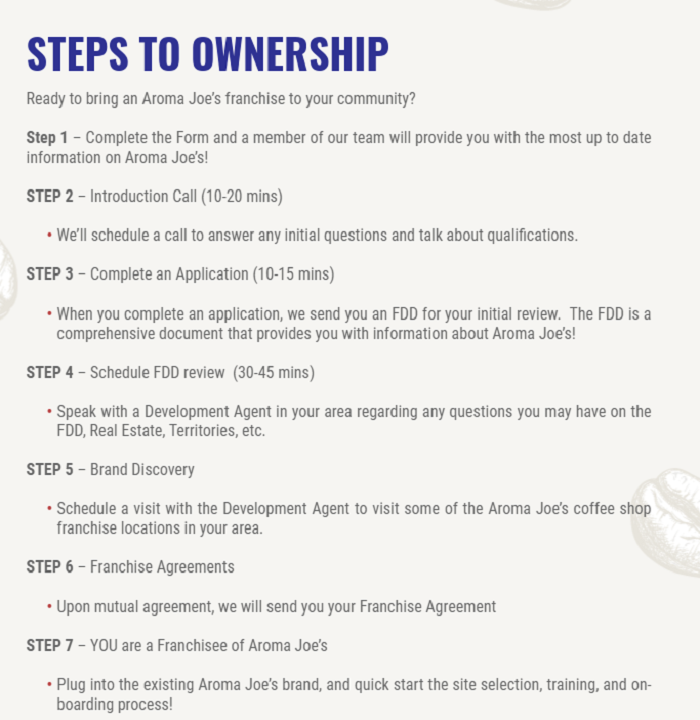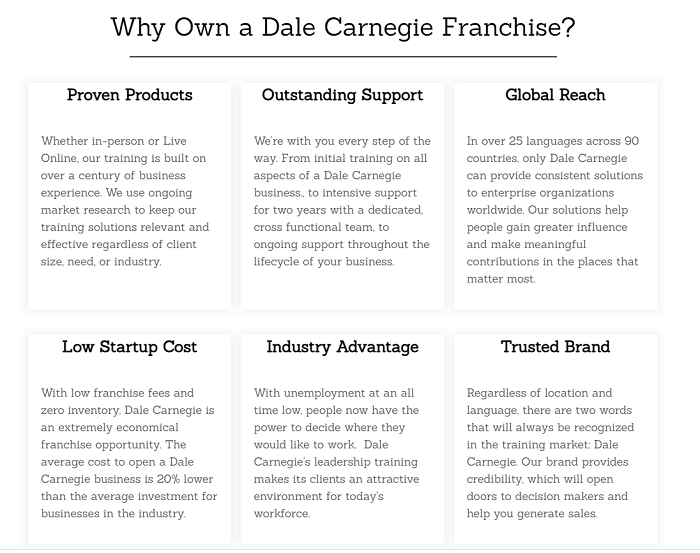
How to Create a B2B Content Strategy
B2B and B2C content marketing require entirely different strategies. However, whether you’re targeting businesses or individual consumers, one point remains the same: Content matters.
Content is how you boost brand awareness, build trust in your company, and empower your customers to solve their problems. However, you can’t just create the occasional blog post or paid ad and hope to generate results.
Instead, you need a targeted B2B content marketing strategy to reach your marketing goals.
Let me show you why a strategy is so important and help you figure out how to reach those valuable business prospects.
Why Do You Need a B2B Content Marketing Strategy?
A content marketing strategy is like a roadmap or a blueprint. While it’s not set in stone, a marketing strategy is a set of guidelines to help you get from point A to point B.
Without a roadmap, you’re more likely to get lost. There’s a higher chance you’ll lose sight of your business goals, and you might struggle to get back on track.
A marketing strategy, then, is key to helping you create the right content at the right time to reach your target clients in the shortest time possible.
You can’t just use any old content marketing strategy, though.
As mentioned, B2B content marketing presents different challenges from B2C content marketing. With B2B, you’re targeting other businesses, whereas, with B2C, you’re targeting individual consumers.
While consumers might be impressed by influencer marketing and emotive product launch campaigns, businesses won’t be swayed by these tactics. Instead, businesses want authoritative content.
They want useful, actionable information to help them solve real commercial challenges and grow their organizations. A clear, methodical marketing strategy can help you create the content needed to impress this audience.
How to Create a B2B Content Marketing Strategy
Every B2B content marketing strategy is unique. However, successful content marketing campaigns typically start with well-defined objectives and a clear understanding of your long-term goals.
Remember, don’t let the whole idea of a marketing “strategy” intimidate you. It’s surprisingly simple to get started once you understand what’s involved, so if you’re ready to build a successful content marketing campaign, here’s where to begin.
1. Identify Your Audience and Their Needs
There’s nothing more important than your user base.
Remember, the whole point of creating content is to convert your audience into paying clients, so your content must meet their specific demands and needs. If your content doesn’t resonate with your audience, they won’t move through your sales funnel.
How do you identify your audience, though?
- First, create your buyer personas.
- Then, segment your prospective audience into subgroups based on, for example, buyer behavior.
- Decide whether you’ll target all these subgroups or if you want to focus on one or two specific segments.
- Once you’ve identified your audience, you can tailor your content to match their specific demands.
Ultimately, what matters to your core audience should matter to you, so you must first identify their problems and then consider how you can solve them through your content.
2. Use Micro-Targeting to Narrow Down Your Focus
You’ve identified your target audience, you know what matters to them, and you’re ready to give them a great user experience.
Now, it’s time to actually find those businesses online and generate brand awareness. How do you ensure that your content reaches the right audience, though? It’s all about using the right short and longtail keywords.
Start by using microtargeting. Through microtargeting, you use analytics data to reveal key information such as buyer behavior, preferences, and popular search terms or keywords. Then, you can use a variety of popular keywords in your content to help your audience find you through Google and other search engines.
Check out Ubersuggest for your keyword research. Enter a primary keyword, such as “health insurance,” and scroll through the “keyword ideas” for inspiration:
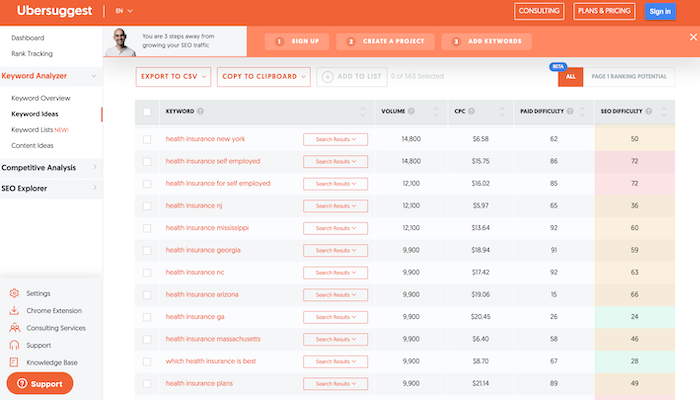
Carefully chosen keywords can help you reach the businesses most likely to require your services.
3. Research Competitors in Your Niche
Unless you’re in a super unique niche, chances are you have numerous competitors vying for your audience’s business.
Look at what makes them successful and research what they’re offering your target customers. What can you offer that sets you apart from your competition?
You need a unique selling point (USP) to draw customers, so consider what you could do better than your competitors and highlight what makes you unique when you’re selling your goods and services to prospects. Here are some tips for doing just that:
- Identify your competitors.
- Evaluate their strengths and weaknesses.
- Clarify what makes your business unique and build your USP around your strengths.
Not sure where to get started? Look to your target audience. Who else are they following? What other businesses are they interested in? Go back to your audience research and see what it reveals.
4. Define Your Goals
Every great marketing strategy needs clearly defined goals to help you stay on track and measure your progress.
How do you choose the right goals? By following the SMART objective. SMART goals are Specific, Measurable, Achievable, Relevant, and Time-bound.
In other words, you’re setting a clear, realistic goal that you can achieve in a certain amount of time. The results are measurable, meaning there’s some quantifiable way you can measure your success and track whether you achieved the goal.
To set SMART goals, ask yourself the right questions. For example, what are you trying to achieve? What steps will you take to reach your objective? Finally, how will you know if you achieved your goal?
If you don’t have the answers to questions like these, your goals need a little more work before you’re ready to develop your marketing strategy.
5. Create Multi-Layered Content
Sure, words are great. After all, you’re trying to impress your audience and demonstrate your industry expertise.
Too much text is pretty daunting, though. If someone’s reading your article and they’re confronted by line after line of unbroken text, you could quickly lose their interest.
The answer? Multi-layered content. With multi-layered content, you’re basically using media such as text, videos, and images to create a visually engaging user experience.
We’ll use one of my own posts on visual marketing as an example. Sure, I include plenty of informative text to educate readers:
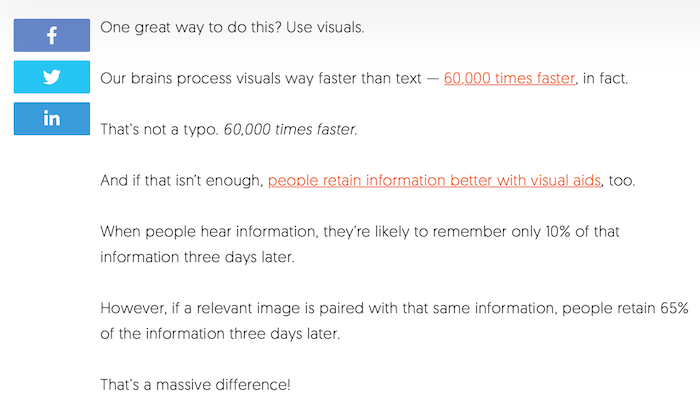
However, I also include images to illustrate my points and break up the walls of text:
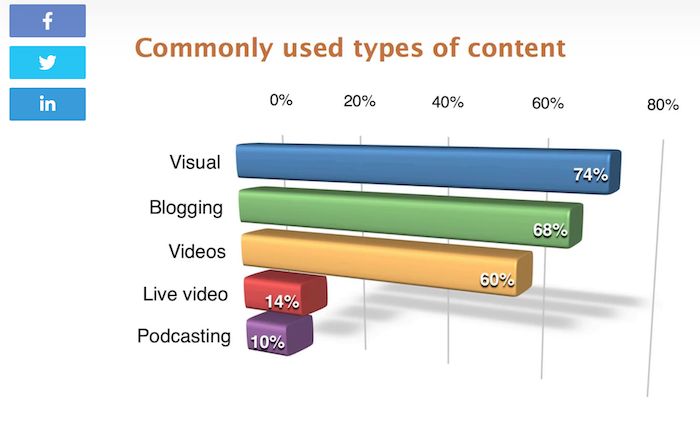
Finally, I include videos for users who prefer a more interactive experience:

You’re targeting business clients. They’re busy people. Keep your content engaging and break it up with a blend of media types to hold their interest and keep your business memorable.
6. Measure Your Results
How do you know if you’re achieving those SMART goals you set earlier? By measuring your results or tracking progress using tools like Google Analytics.
Tracking metrics gives you key insights into what works and, of course, what doesn’t. Once you know what content works best, you can invest your energy into those areas and grow your business more effectively.
Try not to worry if you haven’t met some performance goals. Honestly, not everything you try will work out. Not every ad will generate leads, partnerships can fail, and some content may go unnoticed.
That’s all okay. In fact, it’s normal. Remember, you’re experimenting with different angles, so if something’s not working, just pivot and try something new.
7. Prioritize Link Building and Collaboration
Want to build brand exposure? Consider collaborating with other businesses. More specifically, make (and accept) some guest posts.
You might be wondering how letting another entrepreneur post on your website helps your own marketing goals. However, this is your opportunity to showcase your connections to your audience.
If your audience sees that other industry leaders want to collaborate with you, then guess what? They’ll immediately trust you more, which makes them more likely to explore your services.
On the other hand, say you want to make a guest post on another website. Great. Not only will the post boost your exposure and increase your authority within your niche, but it’s essentially free advertising for your brand. Sounds like a win-win, right?
Here’s an example from when I guest posted on Entrepreneur. Through this opportunity, I had the chance to reach a wider audience and help support their marketing goals:

Don’t be afraid to collaborate as part of your B2B content marketing strategy.
8. Promote Your Content Across Different Platforms
Where do your prospective customers hang out? If you researched your audience earlier, you already know the answer to this question, so your focus should now be on reaching these prospects as part of a targeted marketing campaign.
How you reach these potential clients all depends on your audience demographics, but here are some general tips.
First, improve your website’s discoverability in search engines. The goal is to secure a first-page search ranking for your chosen keywords, so optimize your pages for SEO by adding meta descriptions, including alt text with your images, and using keywords strategically.
Next, run a paid ads campaign. Paid ads ensure you shoot to the top of the search rankings for specific keywords. Monday.com, for example, is one of the first search results you see when you Google “collaboration software for businesses:”

Aside from Google Ads and LinkedIn, you could also run paid ads on popular platforms like Twitter and Facebook. It all depends on where your target audience spends their time, so do your research to generate the best ROI from your paid ad campaigns.
Do you need any advice on choosing the right keywords for paid ads or platforms to market your B2B company? Check out my consulting services to see how my team could help.
Frequently Asked Questions About B2B Content Marketing
Before you start building your own B2B content marketing strategy, here are some quick takeaways to reflect on.
What Is B2B Content Marketing?
B2B content marketing is a strategy for creating, sharing, and promoting content designed to appeal to a business audience. The goal is to use content to build brand awareness and find new clients.
How Is B2B Content Marketing Different From B2C?
With B2B marketing, you’re targeting business clients. You’re trying to demonstrate your experience, expertise, and skill to convince businesses to work with you.
On the other hand, B2C marketing involves targeting individual consumers. You’re focusing on nurturing leads, building an emotional connection with people, and convincing them to buy a specific product.
What Makes a Good B2B Content Marketing Campaign?
A good B2B content marketing campaign should help build trust in your company, provide valuable information to your audience, and inspire companies to choose your products and services.
Above all, a great content marketing strategy should establish you as an industry leader or innovator in your chosen niche.
Research your target audience to understand what challenges they face, and create content designed to help solve those problems. You should also check out competitors for content ideas and keep an eye on news channels. Aim for a blend of evergreen and timely content to keep your articles, videos, and podcasts varied and fresh.
{
“@context”: “https://schema.org”,
“@type”: “FAQPage”,
“mainEntity”: [
{
“@type”: “Question”,
“name”: “What Is B2B Content Marketing?”,
“acceptedAnswer”: {
“@type”: “Answer”,
“text”: ”
B2B content marketing is a strategy for creating, sharing, and promoting content designed to appeal to a business audience. The goal is to use content to build brand awareness and find new clients.
”
}
}
, {
“@type”: “Question”,
“name”: “How Is B2B Content Marketing Different From B2C?”,
“acceptedAnswer”: {
“@type”: “Answer”,
“text”: ”
With B2B marketing, you’re targeting business clients. You’re trying to demonstrate your experience, expertise, and skill to convince businesses to work with you.
On the other hand, B2C marketing involves targeting individual consumers. You’re focusing on nurturing leads, building an emotional connection with people, and convincing them to buy a specific product.
”
}
}
, {
“@type”: “Question”,
“name”: “What Makes a Good B2B Content Marketing Campaign?”,
“acceptedAnswer”: {
“@type”: “Answer”,
“text”: ”
A good B2B content marketing campaign should help build trust in your company, provide valuable information to your audience, and inspire companies to choose your products and services.
Above all, a great content marketing strategy should establish you as an industry leader or innovator in your chosen niche.
”
}
}
, {
“@type”: “Question”,
“name”: “”,
“acceptedAnswer”: {
“@type”: “Answer”,
“text”: ”
Research your target audience to understand what challenges they face, and create content designed to help solve those problems. You should also check out competitors for content ideas and keep an eye on news channels. Aim for a blend of evergreen and timely content to keep your articles, videos, and podcasts varied and fresh.
”
}
}
]
}
B2B Content Marketing Guide: Conclusion
Do you want to establish your company as an industry leader? Are you trying to convince businesses to choose your company over your competitors? Then a solid B2B content marketing strategy can help you stay on track.
Focus on creating useful content and cultivating a sense of trust in your company, and don’t be afraid to step back and make changes if something’s just not working. Remember, a strategy is a roadmap: It’s not set in stone. Let it guide you, but don’t let it hold you back when you’re ready to move in a new direction.
Have you tried B2B content marketing yet? How are you finding the process?




